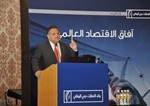 Long-term growth is expected to continue in the non-oil sectors in the Kingdom of Saudi Arabia, with the massive government spending on infrastructure projects acting as a catalyst for the transport, hospitality and real estate sectors, said Arjuna Mahendran, Chief Investment Officer, Emirates NBD Wealth Management.
Long-term growth is expected to continue in the non-oil sectors in the Kingdom of Saudi Arabia, with the massive government spending on infrastructure projects acting as a catalyst for the transport, hospitality and real estate sectors, said Arjuna Mahendran, Chief Investment Officer, Emirates NBD Wealth Management.
Addressing Saudi-based investors at the Emirates NBD CIO Roadshow in Riyadh, Mahendran emphasised that the strong performance of Tadawul, the Saudi Stock Exchange, during 2013, had given a significant boost to business confidence and long term economic prospects of the Kingdom, particularly in the non-oil sectors.
“While more than 70 per cent of the listed equities in Tadawul are currently oil-related entities, there has been a growing emphasis on diversification in capital markets during the last year. We believe this will result in several IPOs from high growth companies in the non-oil sector during this year,” said Mahendran, emphasising that Saudi Arabia continues to be a high growth market in the GCC.
Mahendran pointed out that the growth witnessed in the Kingdom was reflective of the robust growth across the GCC region. He said that despite the growing risk in some of the global financial markets there has been broad economic recovery in the US, Japan and the GCC region, which has led to these regions underpinning the strategic asset allocation and broader investment strategy of Emirates NBD Wealth Management.
He particularly underlined the cement companies in the GCC region, which are beneficiaries of the boom in infrastructure construction by regional governments and the continued strong earnings of GCC telecommunications companies, which offer high dividends to investors. Mahendran also underlined that such dividends are sustainable, given high barriers to entry for foreign telcos into the region.
Mahendran also expressed great confidence in the manufacturing sector in Saudi Arabia, which he said “continues to thrive and will be a strong growth avenue.” However, sounding a cautionary note, he said that the growing emphasis on the Nitaqat Saudisation programme could put some pressure on labour costs.
Placing the Saudi growth story in the context of GCC growth, Mahendran said that there were several reasons to remain invested in GCC equities. These included improving economic and business indicators across the region, sustainable earnings growth and positive repercussions across the region from the MSCI inclusion of Qatar and the UAE. He added that the improving volumes, liquidity and foreign ownership limits, were expected to generate a spate of IPOs to provide greater depth and breadth to the GCC markets.
Calling the GCC “an oasis in the Emerging Markets storm,” Mahendran said that the wider GCC countries had recently set off a virtuous cycle of a stabilisation in bank loan provisioning, and enhanced provision write-backs on bank balance sheets, which had in turn strengthened the flow of bank credit throughout the region. Additionally, the inclusion of the UAE and Qatar stock markets in the MSCI Emerging Markets Index is expected to bring investments into the region from managers of large passive institutional funds globally.
